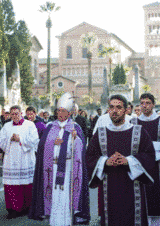Lent 2015
Pope Francis's Message
(cf Jas 5, 8) - in Arabic, English, French, German, Italian, Polish, Portuguese & Spanish
Strengthen your hearts
Dear Brothers and Sisters,
Lent is a time of renewal for the Church, for the communities and individual believers. Above all, however, it is a “time of grace” (2 Cor 6, 2). God does not ask (of) us anything that He has not first given us: “We love because He has loved us first” (1 Jn 4, 19). He is not indifferent to us. He has each of us in his heart, he knows us by name, he cares for us and he seeks us when we leave/turn away from him. He is interested in each one of us; his love impedes/prevents him from being indifferent to what happens to us. Yet it happens that when we are well and we feel good, we forget about others (something that God the Father never does), we are not interested in their problems, nor their sufferings, nor the injustices they endure… so our hearts fall into indifference: while I am relatively well and comfortable, I forget about those who are not well. This selfish attitude of indifference today has taken on a world dimension, to such a point that we can speak of a globalization of indifference. It is a malaise that we, as Christians, must confront.
When the people of God is converted to his love, it finds the answers to these questions that history continually raises. One of the most urgent challenges upon which I want to dwell/focus in this Message is that of the globalization of indifference.
Indifference towards our neighbour and towards God is also a real temptation for us Christians. We therefore need to hear each Lent the cry of the prophets who raise their voices and wake us up.
God is not indifferent to the world, but loves it all the way to giving his Son for the salvation of every man. In the Incarnation, in the earthly life, in the death and resurrection of the Son of God, the door is opened definitively between God and man, between heaven and earth. And the Church is like the hand that holds this door open through the proclamation of the Word, the celebration of the Sacraments, the witness of faith which is rendered efficacious in/actualised/acting through love/charity (cf Gal 5, 6). However, the world tends to close in on itself and to shut this door through which God enters into the world and the world into Him. Thus the hand, which is the Church, must never be surprised if it is rejected, crushed and wounded.
The people of God therefore has need of renewal, so as not to become indifferent and so as not to close in on itself. I would like to propose three passages upon which to meditate for this renewal.
1. “If one member suffers, all suffer with him” (1 Cor 12, 26) – The Church
The love (charity) of God which breaks (through) the deadly/fatal closure in on ourselves which is indifference, is offered to us by the Church with her teaching and, above all, with her witness. Yet we can only bear witness to something that we have first/before experienced. A Christian is the one/someone who allows God to clothe him with his goodness and mercy, to clothe him with Christ, so as to become like Him, the servant of God and of men. We are reminded of this in the liturgy of Holy Thursday with the rite of the washing of feet. Peter did not want Jesus to wash his feet, but then he understood that Jesus does not wish to be only an example of how we must wash one another’s feet. This service can only be done by those who have first let their feet be washed by Christ. Only they have “a part” with him (Jn 13, 8) and thus can serve man.
Lent is a propitious time to let ourselves be served by Christ and thus become like Him. This happens when we listen to the Word of God and when we receive the sacraments, in particular the Eucharist. In it/there we become that which we receive: the body of Christ. In this body that indifference that so often seems to take power over/possess our hearts, has no place. For whoever is of Christ belongs to one body and in Him one is not indifferent to one another. “If one member suffers, all the members suffer together; and if one member is honoured, all the members rejoice with him” (1 Cor 12, 26).
The Church is the communio sanctorum not only because in her the saints participate, but also because she is the/a communion of holy things: the love of God that is revealed to us in Christ and all his gifts. Among them there is also the response of those who let themselves be touched by such love. In this communion of saints and in this participation in holy things, no one possesses (anything) only for oneself/for oneself alone, but what(ever) one has is for everyone. And since we are united in God, we can do something also/even for those who are far off/distant, for those who with only our own strength/forces we could never reach, because with them and for them, we pray to God that we may all be open/open ourselves to his work of salvation.
2. “Where is your brother?” (Gen 4:9) – (The) Parishes and Communities
All that has been said about the universal Church needs to be translated into the life of parishes and communities. In these ecclesial realities can one experience being part of a single/one body? A body which together receives and shares that which/what God wishes to give? A body which knows and takes care of its weakest, poorest and littlest members? Or do we take refuge in a universal love that commits/engages itself far away in the world, but forgets the Lazarus sitting in front of/before his own shut/closed door (Lk 16, 19-31)?
(So as) to receive and make fully fruitful that which God gives us, the boundaries of the visible Church must be surpassed/overcome in two ways.
In the first place, by uniting ourselves in prayer with the Church in heaven. The prayers of the Church on earth establish a communion of mutual service and goodness which reaches up into the sight of God. Together with the saints who have found their fulfilment in God, we form part of that communion in which indifference is conquered by love. The Church in heaven is not triumphant because she has turned her back on the sufferings of the world and rejoices in splendid isolation. Rather, the saints already joyfully contemplate the fact that, through Jesus’ death and resurrection, they have triumphed once and for all over indifference, hardness of heart and hatred. Until this victory of love penetrates the whole world, the saints continue to accompany us on our pilgrim way. Saint Therese of Lisieux, a Doctor of the Church, expressed her conviction that the joy in heaven for the victory of crucified love remains incomplete as long as there is still a single man or woman on earth who suffers and cries out in pain: “I trust fully that I shall not remain idle in heaven; my desire is to continue to work for the Church and for souls” (Letter 254, July 14, 1897).
We share in the merits and joy of the saints, even as they share in our struggles and our longing for peace and reconciliation. Their joy in the victory of the Risen Christ gives us strength as we strive to overcome our indifference and hardness of heart.
In the second place, every Christian community is called to go out of itself and to be engaged in the life of the greater society of which it is a part, especially with the poor and those who are far away. The Church is missionary by her very nature; she is not self-enclosed but sent out to every nation and people.
Her mission is to bear patient witness to the One who desires to draw all creation and every man and woman to the Father. Her mission is to bring to all a love which cannot remain silent. The Church follows Jesus Christ along the paths that lead to every man and woman, to the very ends of the earth (cf. Acts 1:8). In each of our neighbours, then, we must see a brother or sister for whom Christ died and rose again. What we ourselves have received, we have received for them as well. Similarly, all that our brothers and sisters possess is a gift for the Church and for all humanity.
Dear brothers and sisters, how greatly I desire that all those places where the Church is present, especially our parishes and our communities, may become islands of mercy in the midst of the sea of indifference!
3. “Make your hearts firm!” (James 5:8) – Individual Christians
As individuals too, we are tempted by indifference. Flooded with news reports and troubling images of human suffering, we often feel our complete inability to help. What can we do to avoid being caught up in this spiral of distress and powerlessness?
First, we can pray in communion with the Church on earth and in heaven. Let us not underestimate the power of so many voices united in prayer! The 24 Hours for the Lord initiative, which I hope will be observed on 13-14 March throughout the Church, also at the diocesan level, is meant to be a sign of this need for prayer.
Second, we can help by acts of charity, reaching out to both those near and far through the Church’s many charitable organizations. Lent is a favourable time for showing this concern for others by small yet concrete signs of our belonging to the one human family.
Third, the suffering of others is a call to conversion, since their need reminds me of the uncertainty of my own life and my dependence on God and my brothers and sisters. If we humbly implore God’s grace and accept our own limitations, we will trust in the infinite possibilities which God’s love holds out to us. We will also be able to resist the diabolical temptation of thinking that by our own efforts we can save the world and ourselves.
As a way of overcoming indifference and our pretensions to self-sufficiency, I would invite everyone to live this Lent as an opportunity for engaging in what Benedict XVI called a formation of the heart (cf. Deus Caritas Est, 31). A merciful heart does not mean a weak heart. Anyone who wishes to be merciful must have a strong and steadfast heart, closed to the tempter but open to God. A heart which lets itself be pierced by the Spirit so as to bring love along the roads that lead to our brothers and sisters. And, ultimately, a poor heart, one which realizes its own poverty and gives itself freely for others.
During this Lent, then, brothers and sisters, let us all ask the Lord: “Fac cor nostrum secundum cor tuum”: Make our hearts like yours (Litany of the Sacred Heart of Jesus). In this way we will receive a heart which is firm and merciful, attentive and generous, a heart which is not closed, indifferent or prey to the globalization of indifference.
It is my prayerful hope that this Lent will prove spiritually fruitful for each believer and every ecclesial community. I ask all of you to pray for me. May the Lord bless you and Our Lady keep you.
From the Vatican, 4 October 2014, Feast of Saint Francis of Assisi
FRANCIS
Papa Francis' Homily at Mass on Ash Wednesday
at the Basilica of St Sabina on the Aventine Hill
18 February 2015 - in English, French, German, Italian, Portuguese & Spanish
"As the People of God begin the journey of Lent, the time in which we seek to be more firmly united to the Lord, to share the mystery of His Passion and His Resurrection.
Today’s liturgy offers us first and foremost a passage from the Prophet Joel, whom God sent to call the People of God to repentance and conversion, due to a natural disaster (a plague of locusts) which was devastating Judea. The Lord alone can save us from the scourge and it is therefore necessary to entreat Him with prayer and fasting, confessing one’s sins.
The Prophet emphasizes interior conversion: “return to me with all your heart” (2:12).
Returning to the Lord “with all your heart” means to begin the journey not of a superficial and transitory conversion, but rather of a spiritual itinerary with regard to the most intimate place of our person. The heart is, indeed, the seat of our feelings, the centre in which our decisions, our attitudes mature. That “return to me with all your heart” involves not only individuals, but is extended to the community as a whole. It is a convocation directed to everyone: “gather the people. Sanctify the congregation; assemble the elders; gather the children, even nursing infants. Let the bridegroom leave his room, and the bride her chamber” (v. 16). The Prophet pauses particularly on the prayer of the priests, pointing out that it is to be accompanied by tears. It will do us good, all of us, but especially for us as priests, at the beginning of Lent, to ask for the gift of tears, so as to render our prayer and our journey of conversion ever more authentic and free from hypocrisy. It will do us good to ask ourselves this question: “Do I weep? Does the Pope weep? Do the cardinals weep? Do bishops weep? Do the consecrated weep? Do priests weep? Is there weeping in our prayers?”. And this is precisely the message of today’s Gospel. In the passage from Matthew, Jesus again reads the three works of mercy called for by Mosaic law: almsgiving, prayer and fasting. He distinguishes the external disposition from the interior disposition, from the weeping of the heart. Over time, these prescriptions were corroded by external formalism, or they even mutated into a sign of social superiority. Jesus highlighted a common temptation in these three works, that can be summarized precisely as hypocrisy (He mentions it three times): “Beware of practicing your piety before men in order to be seen by them.... When you give alms, sound no trumpet before you, as the hypocrites do.... And when you pray, you must not be like the hypocrites; for they love to stand and pray... that they may be seen by men.... And when you fast, do not look dismal, like the hypocrites...” (Mt 6:1, 2, 5, 16). You know, brothers, that hypocrites do not know how to weep, they have forgotten how to weep, they do not ask for the gift of tears.
When one performs a good work, the desire arises almost instinctively in us to be esteemed and admired for this good action, to gain satisfaction from it. Jesus calls us to perform these gestures without ostentation, and to rely solely on the reward of the Father “who sees in secret” (Mt 6:4, 6, 18).
Dear brothers and sisters, the Lord never tires of having mercy on us, and wants to offer us His forgiveness once again — we all need it — , inviting us to return to Him with a new heart, purified of evil, purified by tears, to take part in His joy. How should we accept this invitation? St Paul advises us: “We beseech you on behalf of Christ, be reconciled to God” (2 Cor 5:20). This power of conversion is not only the work of mankind, it is letting oneself be reconciled. Reconciliation between us and God is possible thanks to the mercy of the Father who, out of love for us, did not hesitate to sacrifice His only begotten Son. Indeed Christ, who was just and without sin, was made to be sin (cf. v. 21) when, on the Cross, He took on the burden of our sins, and in this way He redeemed and justified us before God. “In Him” we can become just, in Him we can change, if we accept the grace of God and do not allow this “acceptable time” to pass in vain (6:2). Please, let us stop, let us stop a while and let ourselves be reconciled to God.
With this awareness, we begin the Lenten journey with trust and joy. May Immaculate Mother Mary, without sin, sustain our spiritual battle against sin, accompany us at this acceptable time, so that we may come together to sing of the exultant victory on Easter Day. And as a sign of the will to let ourselves be reconciled to God, in addition to the tears that will be “in secret”, in public we will perform this gesture of the imposition of Ashes on the head. The celebrant speaks these words: “Remember that you are dust, and to dust you shall return” (cf. Gen 3:19); or repeats the exhortation of Jesus: “Repent, and believe in the Gospel” (cf. Mk 1:15). Both formulae are a reference to the truth of human existence: we are limited creatures, always sinners in need of repentance and conversion. How important it is to listen to and accept this call in this time of ours! The call to conversion is thus an incentive to return, as the son in the parable did, to the arms of God, gentle and merciful Father, to weep in that embrace, to trust in Him and entrust ourselves to Him."









